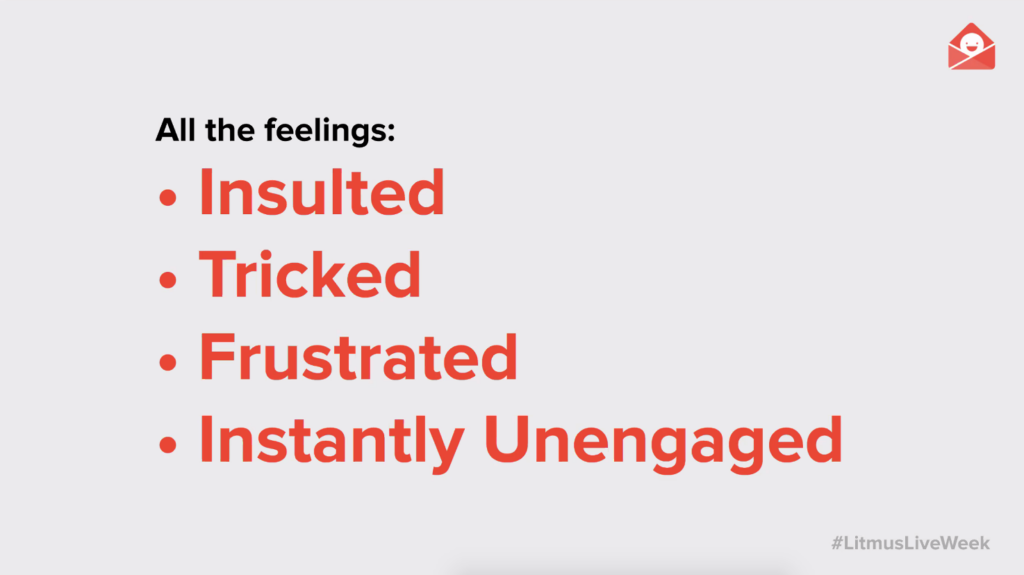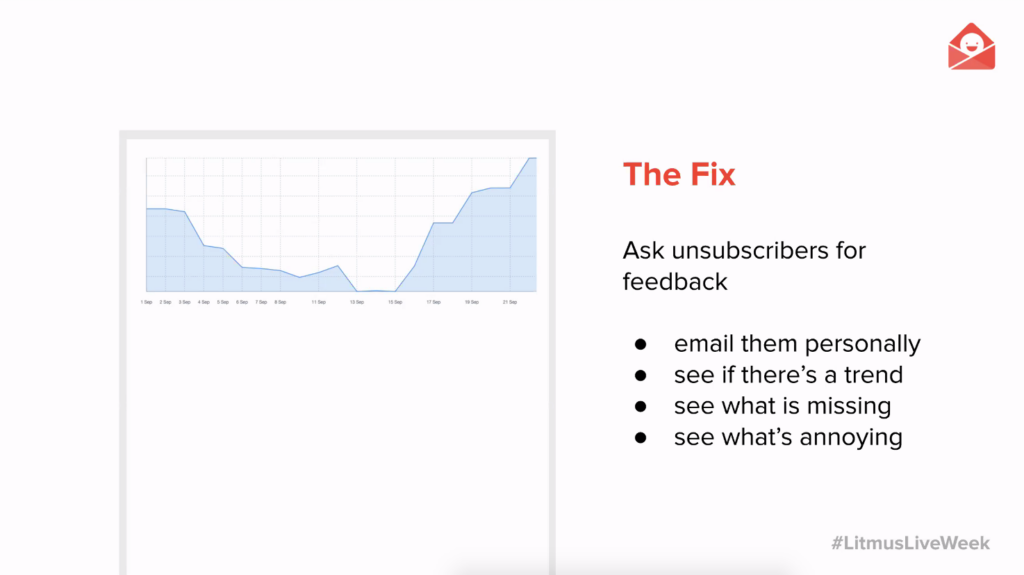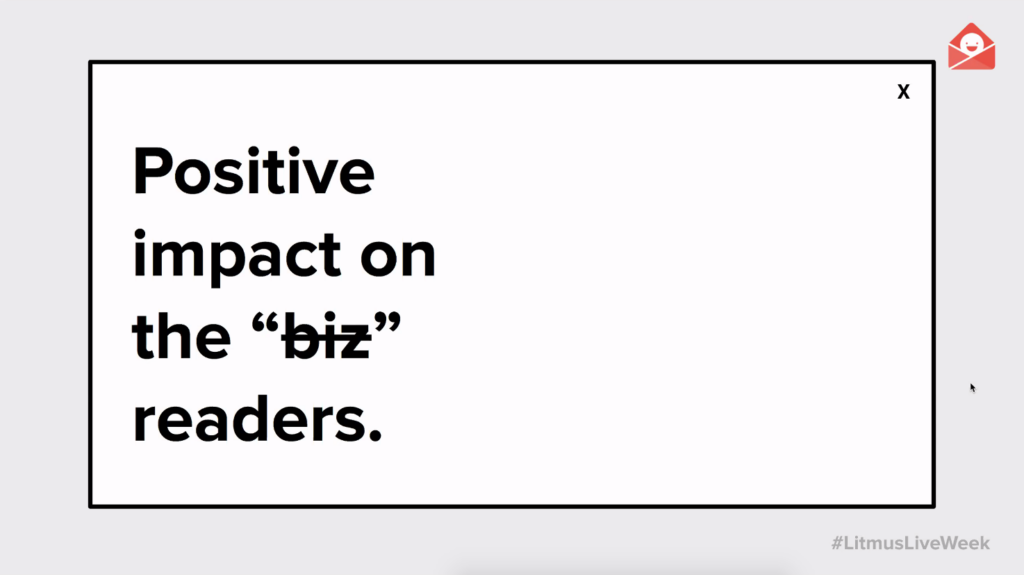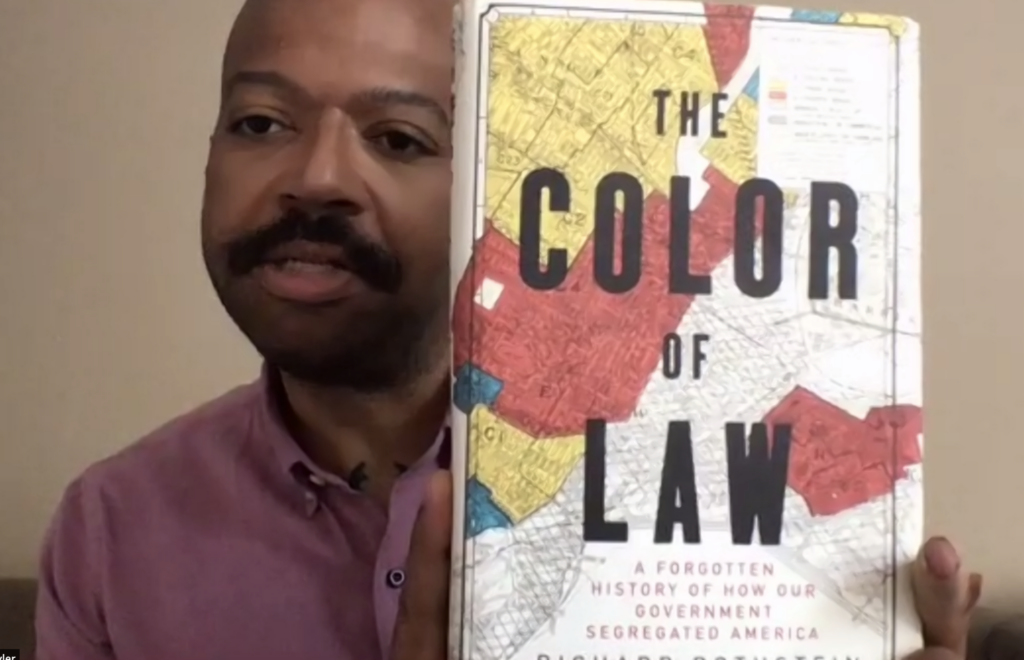Litmus Live Week 2020: Day 4 Highlights
We’re in the homestretch of Litmus Live Week, and it has been pretty awesome so far. Day 4 today was no exception! Jaina Mistry, Lily Worth, and I share our key takeaways from today’s live sessions. Scroll on down…
But if you want to catch up on highlights from earlier in the week first, check ‘em out here:
By the way, it’s not too late to sign up for Litmus Live Week. For real! It’s 100% free, you can still watch Friday’s sessions, plus get the recordings of everything else you missed after we wrap up.
Anyway, on to today’s takeaways!
Do Email Subscription Pop-Ups Really Work? | Mike Nelson @ Really Good Emails
Fact: Pop-ups are annoying. But they’re effective for growing your email subscriber list… or are they? Mike Nelson from Really Good Emails shared the research he found about pop-ups, why people hate them, how they can be better, and his journey with testing out the research himself on the Really Good Emails website. Here are the key takeaways…
Pop-ups are annoying and can penalize you
Yes, we know pop-ups are annoying, but just how annoying? According to the Coalition for Better Ads, nearly 75% of people surveyed find pop-ups very or extremely annoying. They also find them distracting and creepy.
DO NOT NEG YOUR SUBSCRIBERS IN POP-UPS. Do not shame your potential subscribers with stuff like "No, I don't like money and I'm a bad person". #LitmusLive #LitmusLiveWeek
— Anne Tomlin (@pompeii79) September 17, 2020
As if that’s not bad enough already, Google also penalizes your search rankings if your pop-up covers the main content after landing, appears as an interstitial, or forces the dismissal of a standalone interstitial before accessing content.
Build relationships, not lists
So it’s important to change your focus from vanity metrics like list growth and open rates to your relationship with your subscribers.
Mike tried a crazy thing and removed the email subscription pop-up on his website. It may not be a surprise to you that his list size started declining, but the insight here is that it actually revealed a weakness in his email marketing program. A subset of his readers didn’t like his emails enough to stay subscribed, so he focused on the relationship with his subscribers and asked them for feedback.
After making adjustments and without a pop-up hiding underlying issues, he saw an uptick in subscribers again and can now better predict organic growth.
Shift the pop-up mentality: Go from nagging to nudging
No one likes to be nagged. But nudging is more like a gentle prod, so how can pop-ups nudge and remove friction? It’s all about showing value to your potential subscribers by being clear in your headline and copy and using social proof, for example. Essentially, how can you create a positive impact on your readers?
Cause and Effect: A Fireside Chat on Inclusivity in Marketing | Kevin Tyler @ UCLA School of Nursing, Cynthia Price @ Litmus
Kevin spoke with Cynthia about the importance of prioritizing inclusiveness in every aspect of your marketing strategy and the responsibility of brands to showcase diverse voices, and finding those viewpoints that support your company’s mission and values. Here are the key takeaways:
Brave decisions & brand values
Brave decisions need to be made in marketing to normalize diversity. We need to open minds through message execution. Kevin referenced his post for Campaign Monitor this year, written shortly after George Floyd’s death.
Authentic approaches are required. Values and purpose should be the North Star, not transactions. Overall brand equity is a long gain.
Internal changes & DEI programs
Cynthia asked how companies can be kept accountable and how we can make change happen. Kevin expressed that the only way you can truly understand how another life lives is you have to get close to it (he referenced Bryan Stevenson’s book, “Just Mercy“). Investment in the local community, agencies can be insular, people in our neighborhood could give us a better understanding.
For a DEI program to become infused in company culture, intent is very important. Don’t hire a DEI Manager as protection from being sued. Hire someone who can navigate you to being better as a company or as people.
Better marketers
These difficult conversations are ones that have to be had now. Systemic racism needs to be broken apart. We need to educate ourselves on how we got here, we need to learn and collect information to be better marketers.
The more you know about the world, the easier it is to message to the people you want to message to.
At the end of the session, Kevin recommended two more books:
- “The Color of Money: Black Banks and the Racial Wealth Gap” by Mehrsa Baradaran
- “The Color of Law” by Richard Rothstein
Beyond the Shiny New Thing to the Marketing Mindset in the Digital World | Tom Fishburne @ Marketoonist
With new technology, marketers have the ability to connect with consumers more directly and deeply than ever before. But our marketing mindset has not kept up with that potential.
Learn how brands can connect and engage in moments that matter and bring the right mindset to take full advantage of email as a marketing channel.
Here are the key takeaways:
Identify your “need in the moment”
In the moment, people are more loyal to what their “need in the moment” is rather than a specific brand. By identifying your customers’ “need in the moment” and building a marketing strategy from that, you’ll achieve a much more successful and creative marketing strategy.
If we're not careful we can forget that consumers don't care about our brands as much as we do @tomfishburne #LitmusLiveWeek pic.twitter.com/3xTNya7v19
— Cynthia Price (@cynthiahprice) September 17, 2020
Red Roof Inn identified their need in the moment (bad weather, cancelled flights) to help them win on keywords and get the bookings they weren’t able to get by competing directly with bigger brands.
What are the moments that matter for your audience?
Humor can be an act of empathy
Humor can help your brand stand out from the crowd and help you connect with your audience. It’s about finding the right type of humor that’s appropriate for your brand and audience.
I hope marketers remember this chart from @tomfishburne when April Fools Day rolls back around and strive for high empathy–if they feel like they absolutely have to participate in this minefield of a holiday. #LitmusLiveWeek pic.twitter.com/y7zK2IbxrF
— Chad S. White (@chadswhite) September 17, 2020
Try to apply some affiliative humor—amusing others as a way to facilitate relationships—to your next email campaign to connect with your audience more with a shared sense of humor.
Be data-driven, not data-blinded
Marketers have got access to more data than ever before. But if we’re not careful we can be mypoic about how we apply it.
https://twitter.com/BrookeAMcDaniel/status/1306649401142784001
Understanding the difference between correlation and causation can help you avoid letting data lead your astray and towards bad decisions.
Ask yourself, are you looking at the data that really matters to your strategy.
What else is the email community gushing about?
https://twitter.com/JonDoesEmails/status/1306708414882603011
Ahem. @samarowais mic drop moment during #LitmusLiveWeek on her 3-Step Process to Conversion. I was like, "Yeah… what then?" pic.twitter.com/fhkXn4Awet
— D@mon Mitchell (@damonre) September 17, 2020
CSS Art in email session. This made me laugh so hard I scared the kittens! #LitmusLiveWeek #LitmusLive pic.twitter.com/n0sB7t03Wb
— Anne Tomlin (@pompeii79) September 17, 2020
And, oh, by the way… 😉
Psst… amidst all of the #LitmusLiveWeek learnings we have some news to share. Testing is available NOW in Litmus for iOS 14 in iPhone 11 and iPhone 11 Dark Mode! Get testing #EmailGeeks 👀
— Litmus (@litmusapp) September 17, 2020

Magan Le
Magan Le was a Content Marketing Manager at Litmus




